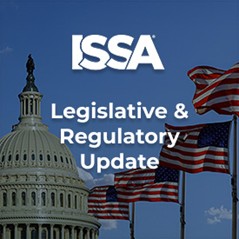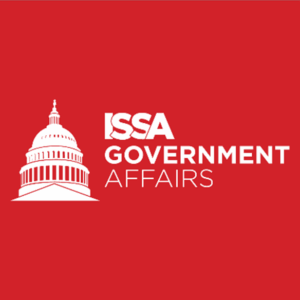ISSA Leg. & Reg. Update – EPR, Circularity, & the Future of the Cleaning Industry
 Welcome to the latest ISSA Legislative & Regulatory Update, a biweekly roundup of the public-policy issues currently impacting the full cleaning supply chain. This update touches on state extended producer responsibility laws, ISSA’s 2025 Advocacy Survey, and more.
Welcome to the latest ISSA Legislative & Regulatory Update, a biweekly roundup of the public-policy issues currently impacting the full cleaning supply chain. This update touches on state extended producer responsibility laws, ISSA’s 2025 Advocacy Survey, and more.
Want to stay informed about critical government affairs impacting the cleaning and facility-solutions industry? Sign up here to have the ISSA Legislative & Regulatory Update emailed directly to you every other week.
ISSA Advocacy

The Sustainable Sweep: EPR, Circularity, and the Future of the Cleaning Industry
What it means: Governments across the United States are grappling with ballooning waste-management costs, mounting landfill pressure, and increased consumer demand for accountability. Extended producer responsibility (EPR) laws shift responsibility away from taxpayers and municipalities and place it squarely on the companies that make and sell products.
Why it matters: EPR regulations are no longer a theoretical conversation in the cleaning industry. They are here, expanding state by state, and reshaping how products are designed, packaged, and brought to market.
What ISSA is doing: In a recent webinar hosted by ISSA, Rebecca Schwartz Altholz, EPR Data Manager at Reverse Logistics Group, and John Nothdurft, ISSA Director of Government Affairs, unpacked the growing wave of packaging legislation, what it means for manufacturers and distributors, and how businesses can prepare for the shift toward a circular economy. Learn more

Enter to Win – Take Our 2025 Advocacy Survey
What it means: ISSA continues to build and strengthen our Government Affairs Department so that we can best represent the interests of our members before federal and state policymakers.
Why it matters: Your responses to this biannual ISSA Advocacy Survey will help us gauge members’ interest in our advocacy efforts, as well as help guide and shape those efforts moving forward.
What ISSA and you are doing: Those who complete the brief survey will be entered to win a $100 gift card! Take the survey now
Additional Updates
Regulatory
Tariffs
Canada to Remove Many Retaliatory Tariffs
Canada will roll back some of its retaliatory tariffs on U.S. imports starting September 1. In step with its southern neighbor, Canada will no longer charge tariffs for U.S. imports compliant with the United States-Mexico-Canada Agreement. The country will match U.S. levies on products that do not adhere to the pact. However, Canada will maintain its retaliatory measures to U.S. sectoral duties on steel, aluminum, and automobiles. Learn more (Supply Chain Dive)
Trump Expands 50% Steel, Aluminum Tariffs to Include Additional Product Types
The Trump administration expanded its 50% steel and aluminum tariffs to include more than 400 additional product categories, increasing the reach and impact of this arm of its trade agenda. The new tariffs, which took effect August 18, expand the scope of the levies that President Trump previously announced on the valuable commodities. The tariff list now covers products such as fire extinguishers, machinery, construction materials, and specialty chemicals that either contain, or are contained in, aluminum or steel. Economists warn that the new levies could further strain the U.S. supply chain and raise prices for consumers. Learn more (U.S. Department of Commerce)
US, EU Formalize Trade Deal
The United States and European Union set out details of their framework trade deal that the transatlantic partners struck last month. In a 3-1/2-page joint statement, the two sides spelled out that 15% U.S. tariffs would apply to most E.U. imports and listed the commitments made, including the E.U.’s pledge to eliminate tariffs on U.S. industrial goods. Learn more (Reuters)
New Federal Rules Aim to Boost Competition for Government Contractors
The rules that govern how U.S. federal agencies procure goods and services received its first significant reform in over four decades. In a move that White House officials say will streamline buying procedures and open the door for more small businesses to compete for government contracts, the Trump administration will work to eliminate one-third of requirements that aren’t mandated by law in future contracts. Learn more (MDM)
Wholesale Prices Rose 0.9% in July
Wholesale prices rose far more than expected in July, providing a potential sign that inflation is still a threat to the U.S. economy, a U.S. Bureau of Labor Statistics report showed. The producer price index, which measures final demand goods and services prices, jumped 0.9% in the month, compared with the Dow Jones estimate for a 0.2% gain. It was the biggest monthly increase since June 2022. Learn more (CNBC)
Legislative
GOP Floats Earmarks to Avert Government Shutdown
Vulnerable incumbents and deficit hardliners are joining forces in an unlikely partnership, pushing U.S. House of Representatives GOP leaders to put earmarks on the table to avoid a government-funding fight this fall. The federal coffers are due to dry up on September 30. And, as part of any agreement to avert a government shutdown on October 1, a significant segment of the House Republican Conference is demanding the inclusion of so-called community project funding. Learn more (Politico)
State & Local News
Battle Continues over LA Minimum Wage
When the Los Angeles City Council passed an ordinance earlier this year creating a US$30 minimum hourly wage for hotel and airport workers by 2028, the long-debated move seemed like a done deal. Instead, it launched a series of competing ballot propositions that city officials are warning could derail city finances and plans for the upcoming Olympic Games. Learn more (LAist)
OH Senate Democrats Introduce Bill to Raise Minimum Wage
A pair of Ohio State Senators are once again trying to raise Ohio’s minimum wage to US$15 per hour. Ohio State Senators Kent Smith (D-Euclid) and Hearcel Craig (D-Columbus) introduced Senate Bill 234 last month, which would raise the minimum wage by a dollar per hour each year until reaching $15 per hour in 2029. Learn more (Cleaning & Maintenance Management)














